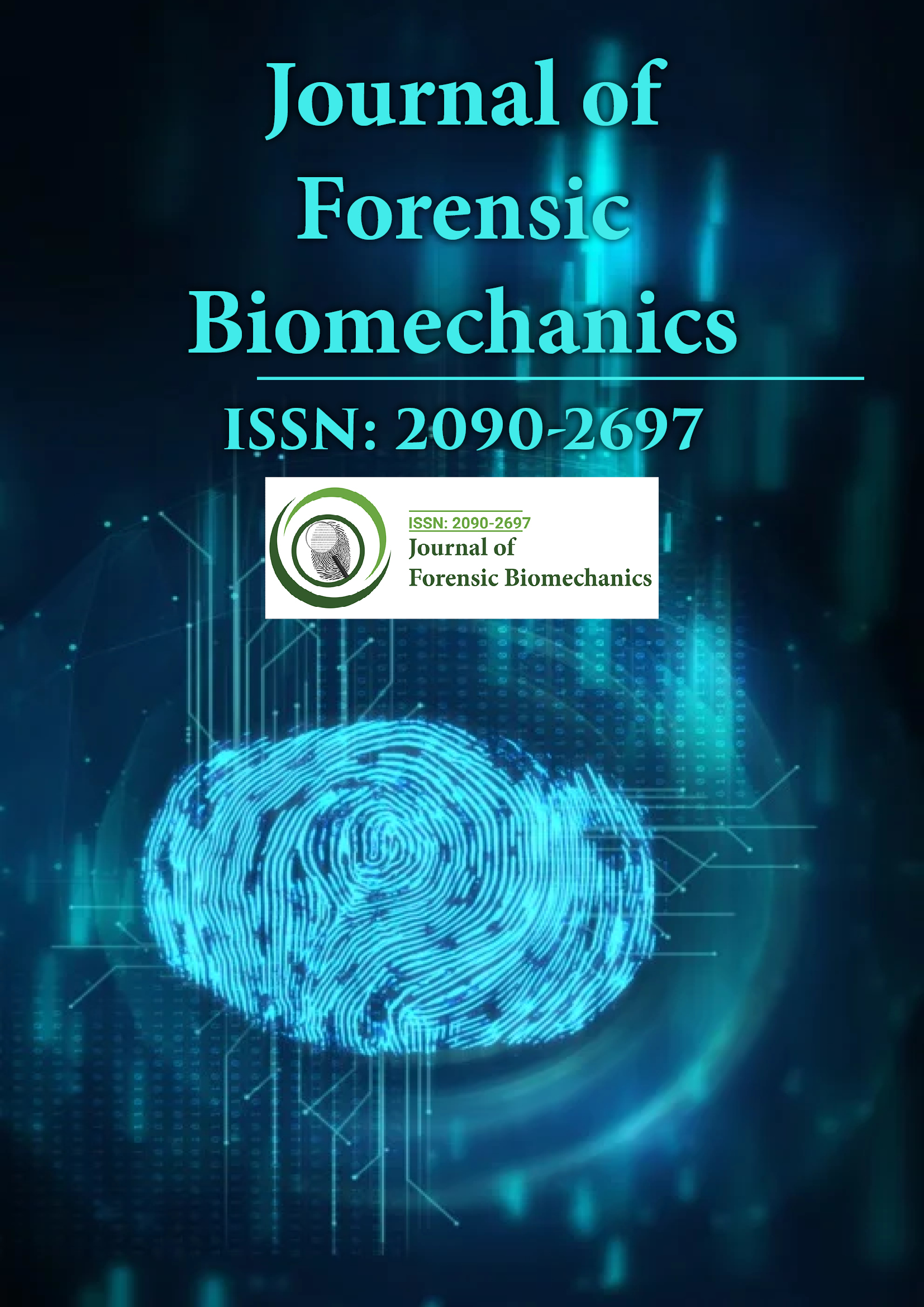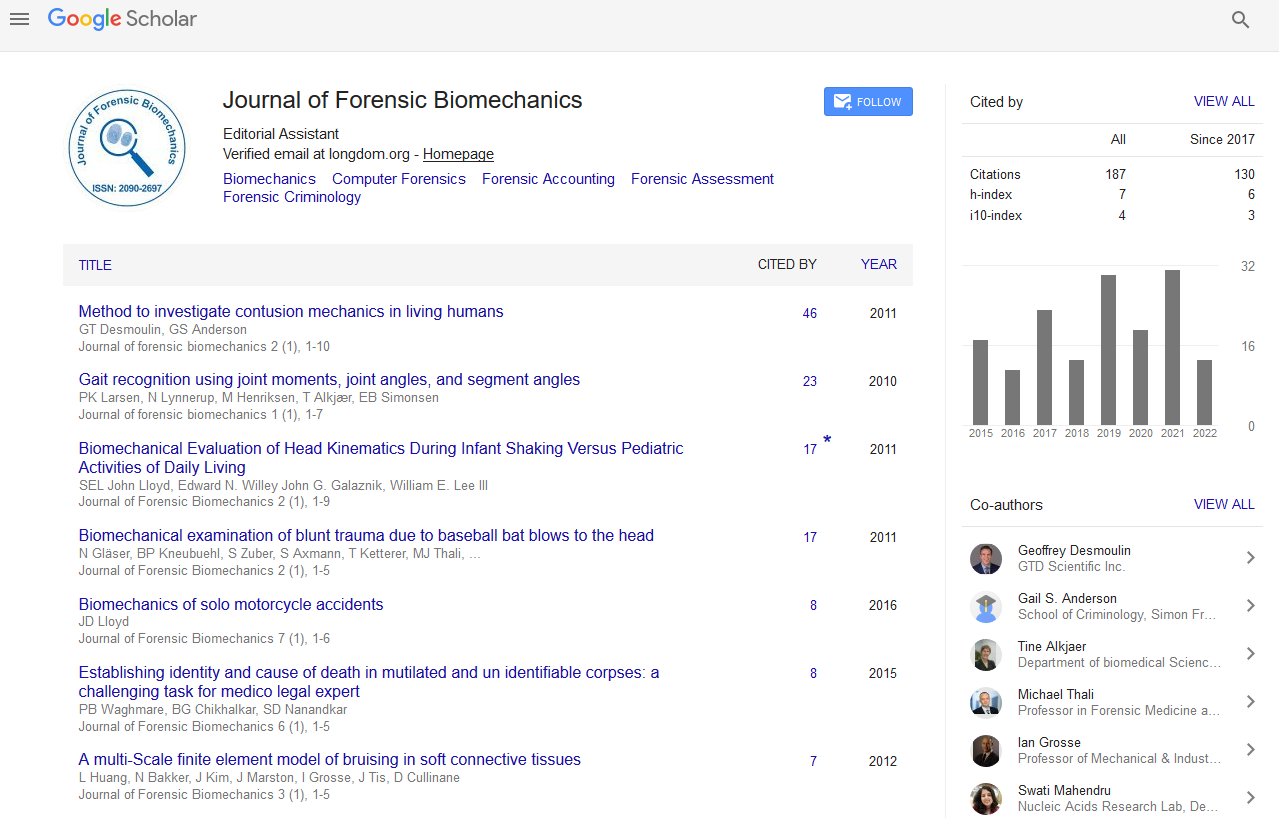Indexed In
- Genamics JournalSeek
- SafetyLit
- Ulrich's Periodicals Directory
- RefSeek
- Hamdard University
- EBSCO A-Z
- Geneva Foundation for Medical Education and Research
- Euro Pub
- Google Scholar
Useful Links
Share This Page
Journal Flyer

Open Access Journals
- Agri and Aquaculture
- Biochemistry
- Bioinformatics & Systems Biology
- Business & Management
- Chemistry
- Clinical Sciences
- Engineering
- Food & Nutrition
- General Science
- Genetics & Molecular Biology
- Immunology & Microbiology
- Medical Sciences
- Neuroscience & Psychology
- Nursing & Health Care
- Pharmaceutical Sciences
Opinion Article - (2023) Volume 14, Issue 1
The Importance of Impartiality in Forensic Assessments
Jacob Banner*Received: 03-Jan-2023, Manuscript No. JFB-23-20630; Editor assigned: 05-Jan-2023, Pre QC No. JFB-23-20630 (PQ); Reviewed: 19-Jan-2023, QC No. JFB-23-20630; Revised: 27-Jan-2023, Manuscript No. JFB-23-20630 (R); Published: 03-Feb-2023, DOI: 10.35248/2090-2697.23.14.422
Description
Forensic assessment is a branch of psychology that involves the application of psychological principles and methods to legal and criminal justice proceedings. Forensic assessments can be conducted in a variety of settings, including criminal and civil courts, correctional facilities, and private practice. The goal of forensic assessment is to provide objective and reliable information to decision-makers in legal and criminal justice proceedings. In this essay, will discuss the importance of forensic assessment, the types of assessments used in forensic evaluations, and the ethical considerations involved in conducting forensic assessments. The Importance of Forensic Assessment Forensic assessment is an essential component of the criminal justice system. It helps to ensure that decisions are based on accurate and reliable information. For example, forensic assessments can help to determine a defendant's competency to stand trial, assess the risk of reoffending, and evaluate the mental state at the time of the offense. Forensic assessments can also be used to provide information to judges and juries about a defendant's mental state, which can be used to determine whether the defendant is guilty of a crime or not.
Types of assessments used in forensic evaluations
There are many types of assessments that can be used in forensic evaluations. Some of the most commonly used assessments include:
Competency to stand trial: This assessment is used to determine whether a defendant has the mental capacity to understand the legal proceedings against them and assist in their own defense.
Criminal responsibility: This assessment is used to determine whether a defendant was legally responsible for their actions at the time of the offense.
Risk assessment: This assessment is used to determine the risk of a defendant reoffending if released from custody.
Mitigation: This assessment is used to determine factors that may mitigate a defendant's culpability or responsibility for the offense.
Sentencing: This assessment is used to determine the appropriate sentence for a defendant.
Psychological autopsy: This assessment is used to determine the mental state of a deceased individual at the time of death.
Child custody: This assessment is used to determine the best interests of a child in a custody dispute.
Ethical considerations in forensic assessment
There are several ethical considerations involved in conducting forensic assessments. First, forensic assessors must be impartial and avoid any conflicts of interest. They must also be competent in the assessment methods they use and the relevant legal and ethical standards. Forensic assessors must also ensure that the assessment is based on reliable and valid information, and that they use the most appropriate assessment tools for the specific case.
In addition, forensic assessors must ensure that they maintain the confidentiality of their clients' information, and that they obtain informed consent before conducting the assessment. Forensic assessors must also be aware of the potential impact of their assessment on the client and must take steps to minimize any harm that may result from the assessment. Finally, forensic assessors must be aware of their own biases and limitations.
They must strive to remain objective and impartial, and they must be willing to acknowledge any limitations or uncertainties in their assessment.
Conclusion
Forensic assessment is a critical component of the legal and criminal justice system. It helps to ensure that decisions are based on accurate and reliable information, and it can have a significant impact on the lives of individuals involved in legal proceedings. Forensic assessments can be conducted in a variety of settings and can involve a range of assessments, including competency to stand trial, risk assessment, and sentencing.
However, conducting forensic assessments also involves several ethical considerations, including the need for impartiality, confidentiality, and informed consent. Forensic assessors must also be aware of their own biases and limitations and strive to remain objective and impartial in their assessments.
Citation: Banner J (2023) The Importance of Impartiality in Forensic Assessments. J Forensic Biomech. 14:422.
Copyright: © 2023 Banner J. This is an open-access article distributed under the terms of the Creative Commons Attribution License, which permits unrestricted use, distribution, and reproduction in any medium, provided the original author and source are credited.

